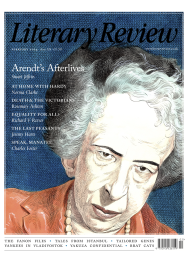Patricia Fara
Explosion of Talent
The Nobel Family: Swedish Geniuses in Tsarist Russia
By Bengt Jangfeldt (Translated from Swedish by Harry D Watson)
Bloomsbury Academic 424pp £25
In 1870, the Swedish industrialist Immanuel Nobel promoted his recent invention, plywood, by listing sixty-three potential uses. One was in the manufacture of a type of safety coffin fitted with breathing holes as well as a lid that could be lifted from the inside and a rope attached to an external bell. It is hardly surprising to learn that Alfred, his youngest surviving son, suffered from an oppressive fear of being buried alive. Long afflicted with chronic syphilis, Alfred rewrote his will the year before he died, leaving most of his vast fortune to fund annual prizes for those who had ‘conferred the greatest benefit to humankind’. Despite raising legal objections, his disappointed relatives failed to annul the bequest that secured their surname perpetual fame.
Alfred Nobel features surprisingly little in The Nobel Family, Bengt Jangfeldt’s collective biography that spans three generations and several countries. There is no entry for him in the index and – in contrast to his two older brothers, Robert and Ludvig – no chapter devoted to him and his activities. One of his more memorable appearances is as a wounded survivor of the ‘Nobel bang’, the name given at the time to an accidental laboratory detonation of nitroglycerine that killed his younger brother Emil. Despite the adverse publicity, Alfred managed to salvage the explosive’s reputation by stabilising it chemically to create dynamite, the catchy name he coined to replace his original choice, Nobel’s Blasting Powder.
A meticulously researched and fact-filled tome, The Nobel Family provides not only a comprehensive history of an individual dynasty but also a wide-ranging analysis of industrial enterprise in Russia, Scandinavia and Germany over a period brought abruptly to a close by the Russian Revolution. Jangfeldt launches his saga in the

Sign Up to our newsletter
Receive free articles, highlights from the archive, news, details of prizes, and much more.@Lit_Review
Follow Literary Review on Twitter
Twitter Feed
It wasn’t until 1825 that Pepys’s diary became available for the first time. How it was eventually decrypted and published is a story of subterfuge and duplicity.
Kate Loveman tells the tale.
Kate Loveman - Publishing Pepys
Kate Loveman: Publishing Pepys
literaryreview.co.uk
Arthur Christopher Benson was a pillar of the Edwardian establishment. He was supremely well connected. As his newly published diaries reveal, he was also riotously indiscreet.
Piers Brendon compares Benson’s journals to others from the 20th century.
Piers Brendon - Land of Dopes & Tories
Piers Brendon: Land of Dopes & Tories - The Benson Diaries: Selections from the Diary of Arthur Christopher Benson by Eamon Duffy & Ronald Hyam (edd)
literaryreview.co.uk
Of the siblings Gwen and Augustus John, it is Augustus who has commanded most attention from collectors and connoisseurs.
Was he really the finer artist, asks Tanya Harrod, or is it time Gwen emerged from her brother’s shadow?
Tanya Harrod - Cut from the Same Canvas
Tanya Harrod: Cut from the Same Canvas - Artists, Siblings, Visionaries: The Lives and Loves of Gwen and Augustus John by Judith Mackrell
literaryreview.co.uk